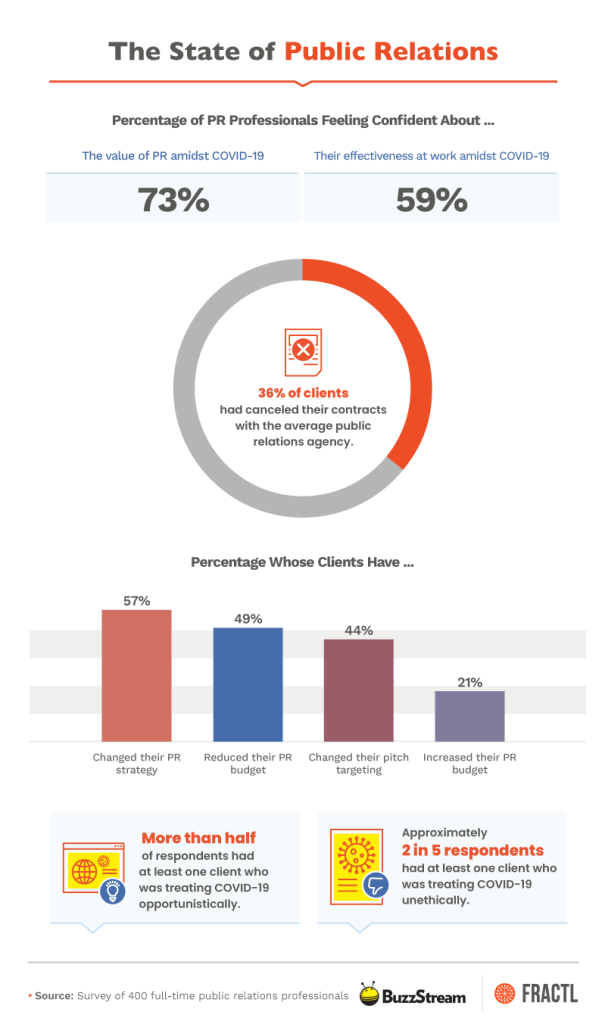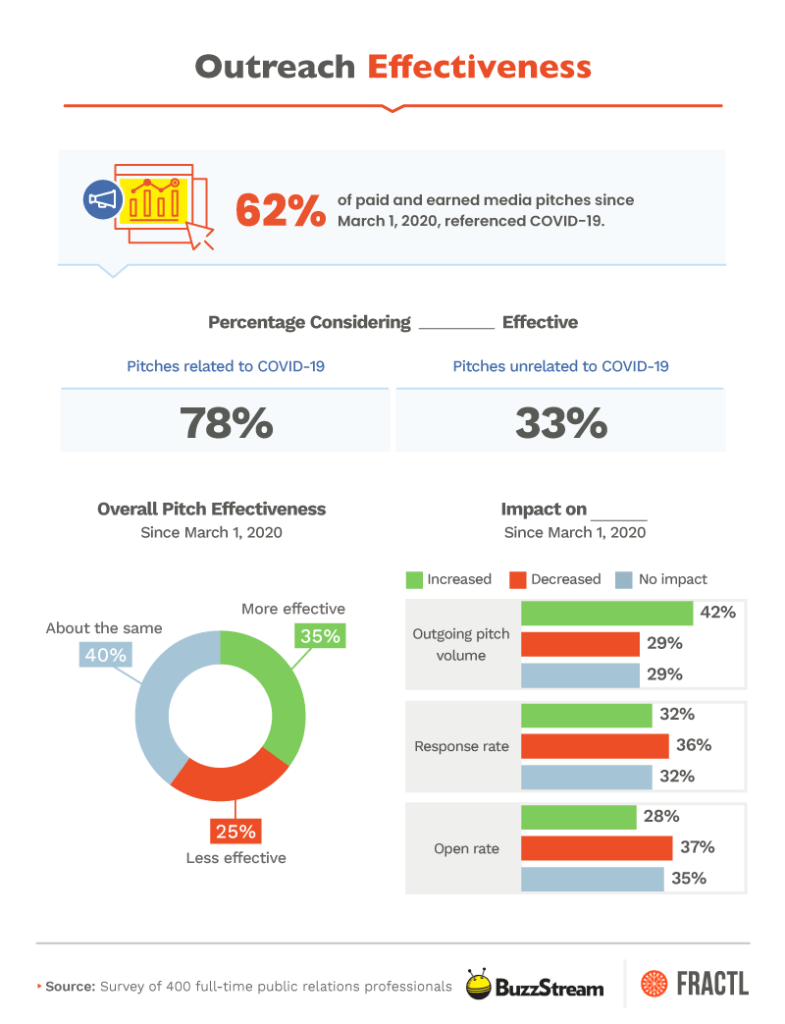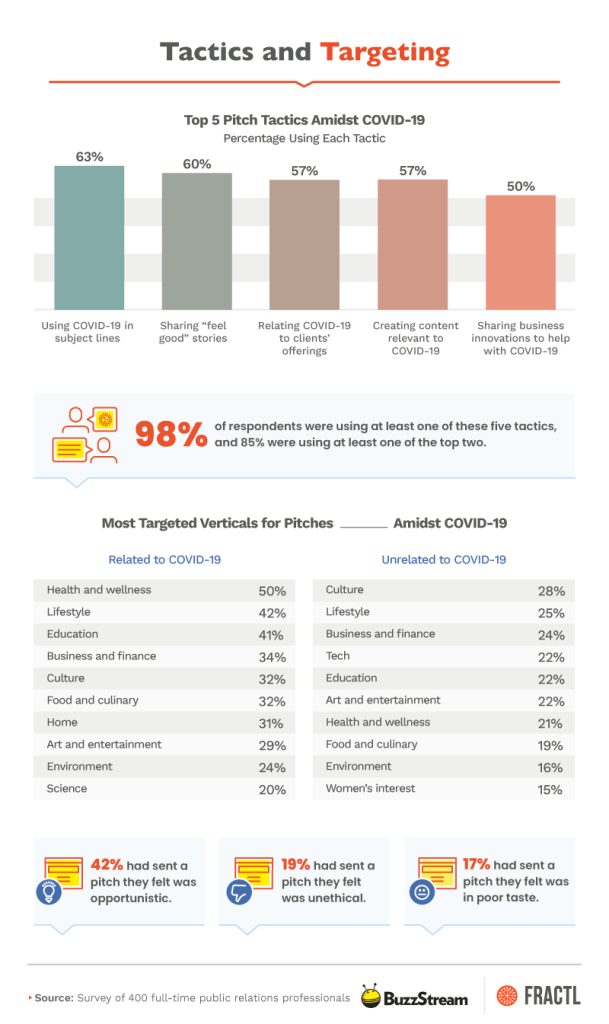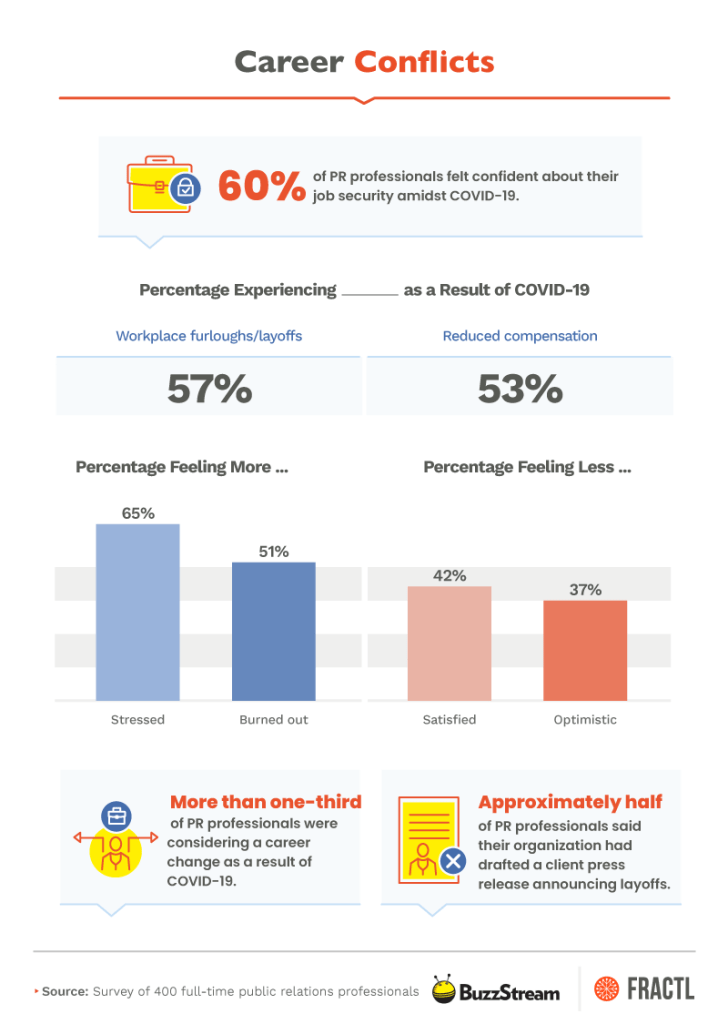The COVID-19 pandemic is uncharted territory for everyone, including public relations (PR) professionals trained to respond to crises. But as more people are turning to social media for distractions and news articles for information, COVID-19 has brought Americans online like never before. Has the current change in climate proven to be beneficial for PR pros, or has this new and delicate situation thrown the industry for a loop as well?
To better understand how COVID-19 is affecting the PR industry, BuzzStream and Fractl surveyed 400 full-time public relations professionals. Read on as we explore the shape of the industry and how it has evolved due to the pandemic.
PR Budgets in Question
First, we looked at budgets, because when cash flow gets tight, some of the first things businesses typically cut are PR and marketing.
Although slashing “monitoring and relationship tools looks a lot better on paper than laying off employees,” according to Muck Rack, doing so may cut off your business’s only lifeline to customers. Still, 49% of PR professionals in our survey reported that clients reduced their PR budget as a result of the COVID-19 pandemic. However, 21% increased their PR spending, signaling that some business owners understand how critical it is to communicate with customers in this current climate.
“These are certainly unprecedented times we’re in, right? Phew! A friend and I were talking about what the next few years look like for agencies, and I hate to admit it’s not looking pretty. But that doesn’t mean it’s all gloom and doom, either. As communicators, we have a real opportunity in front of us. For some, it might be to learn new skills, such as what you might execute with the PESO model; for others, it might be to add revenue streams, such as online courses, virtual events, or books; and for others, it might be finding ways to be incredibly helpful, both through content and community building. However you mold your career in the next couple of years is up to you – and the sky is the limit!”
— Gini Dietrich, founder and author, Spin Sucks
Next, we looked at whether the pandemic is having an affect on the frequency of pitches PR professionals send out. Our findings also uncovered whether PR professionals experience higher success rates with publishers when COVID-19 is mentioned.
Addressing COVID-19 When Pitching
Experts recommend that entrepreneurs lean on PR strategy to survive the global pandemic. Perhaps that’s why roughly three-fourths (73%) of PR professionals surveyed said they are feeling confident about the value of PR amidst COVID-19, and 59% are feeling self-assured about their effectiveness. But it’s more than a feeling, PR pros are following industry recommendations: They’re adjusting their PR strategy (57%) and have changed their pitch targeting (44%).
The reality that we are facing a global pandemic, a health crisis that is impacting people’s mental health, income, and how we socialize, can’t be ignored. And that’s something PR professionals should consider when they pitch (even non-COVID-19 content) or they risk sounding tone-deaf and distasteful when communicating with journalists and the public.
“It’s important, now more than ever, for PR professionals to be pitching pieces that invoke positive emotions. We’ve seen that the media and their readers are eager for content that will lift their spirits and/or be genuinely helpful. The more you can lean into fun, positive, helpful content, the better.”
— Alice Good, Clearlink
Popular Verticals to Pitch
Since March 1, 2020, 62% of paid and earned media pitches referenced COVID-19; it’s a ubiquitous topic and likely will be for some months. And PR professionals considered pitches related to COVID-19 to be 2.3 times more effective than pitches unrelated to the pandemic. However, 36% and 37% reported response and open rates have declined, respectively, though PR pros have increased their pitch rate since March.
In the face of a global crisis, such as that surrounding the novel coronavirus, when everyone is on high alert for news, some PR professionals are pitching opportunistic content. But others have taken the feel-good approach, sharing stories that are fun or positive.
For starters, 42% of the PR professionals in our survey said they had sent a pitch that felt opportunistic, using the COVID-19 pandemic to their benefit. Perhaps far worse, 19% reported sending an unethical pitch, though it’s not clear what about their tactic broke the moral code. According to the Public Relations Society of America’s (PRSA) code of ethics, PR professionals serve the public interest, so perhaps an unethical COVID-19 pitch may be one that puts the public in danger of contracting or spreading the virus.
Of the tactics PR professionals used when pitching, using COVID-19 in subject lines (63%) was the most popular, followed by sharing “feel-good” stories (60%), relating COVID-19 to client offerings (57%), creating content relevant to the pandemic (57%), and sharing business innovation to help with COVID-19 (50%). Virtually every PR professional surveyed (98%) reported using at least one of the top five tactics, and 85% said they were using at least one of the top two.
The most popular verticals pitched were COVID-19-related, and they centered around health and wellness (50%), lifestyle (42%), and education (41%).
PR Professionals’ Pandemic Outlook
Lastly, we took a more personal look at PR professionals. Are they seeing a reduction in their income? Are they experiencing layoffs? What’s their disposition?
As previously mentioned, PR professionals surveyed shared that 49% of clients reduced PR budgets. But with 20.5 million Americans recently unemployed, are PR professionals’ paychecks also taking a hit?
Fifty-three percent of PR professionals saw a reduction in their compensation due to COVID-19, and 57% saw furloughs or layoffs at their employer. Still, three-fifths of those surveyed felt confident about their job security, despite 65% and 51% experiencing stress and burnout, respectively.
“My advice for PR pros on how to succeed in the current climate is to be there for your clients. Be a sounding board for them, first and foremost. Many see the value of PR even more so than before. Then, when it comes to media outreach, if you have product-related news or stories unrelated to COVID-19, it’s OK to pitch those. In talking with reporters, many are looking for stories that aren’t related to the virus. And many members of their audiences are looking for content to consume that isn’t virus-related. Both reporters and their audiences have a level of COVID-19 fatigue.” — Michelle Garrett
PR professionals aren’t alone in their COVID-19-related experiences; the world is feeling the impact together. However, given the nature of their job, PR professionals are processing more pandemic information than the average American. Our findings show that they’re sending out more pitches than before, and some are even putting their ethics into question to get noticed. All of that has likely contributed to their overall stress and weariness.
Managing Stress and Burnout
To best manage stress and burnout, experts suggest maintaining regular schedules and routines. For PR professionals, that could mean keeping up with the industry and maintaining customer contact. Sustain your normal by visiting BuzzStream.com to continue helping your clients effectively manage all their relationships.
Methodology and Limitations
We surveyed 400 full-time PR professionals using the Amazon MTurk platform, Clickworker, and outreach via email and Twitter. Our respondents were a mix of Americans and Europeans. To help ensure that our respondents were paying attention and taking our survey seriously, all respondents were required to identify and correctly answer an attention-check question.
In some cases, questions and responses were rephrased for clarity or brevity. In certain cases, outliers have been excluded. These data rely on self-reporting, and statistical testing was not performed on these findings. Potential issues with self-reported data include, but are not limited to, exaggeration, selective memory, and attribution errors on the part of respondents.
Fair Use Statement
PR budgets are often among the first to go when businesses need to reduce spending, especially during a time like this. But our findings show how PR professionals are staying relevant during the COVID-19 pandemic and why businesses may want to keep them around. We encourage you to share our survey results and assets for noncommercial reuse. All we ask is that you link back here, so readers may view the entire project and review the methodology and limitations.






 Check out the BuzzStream Podcast
Check out the BuzzStream Podcast

